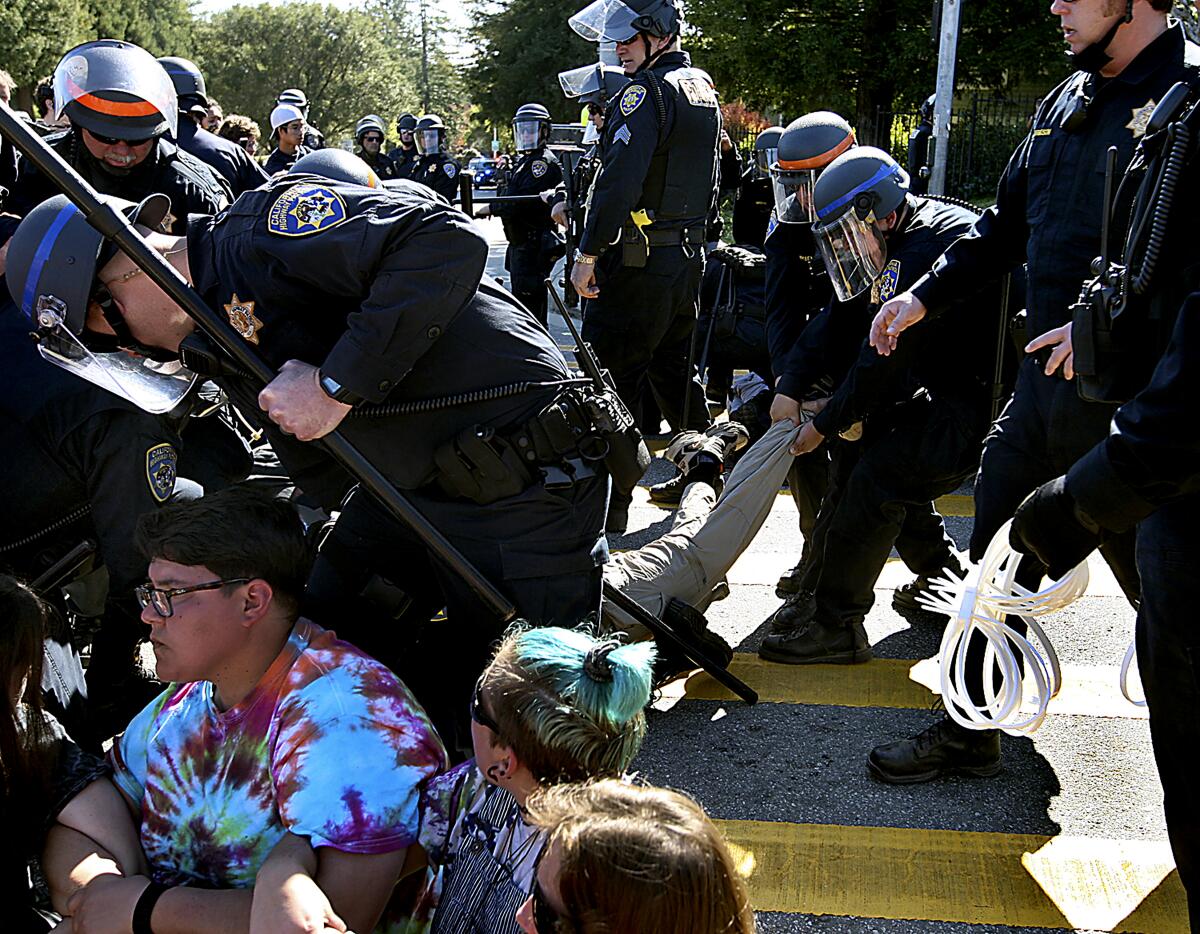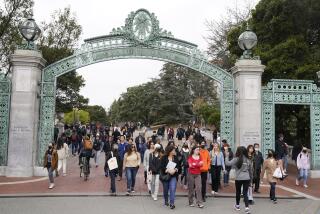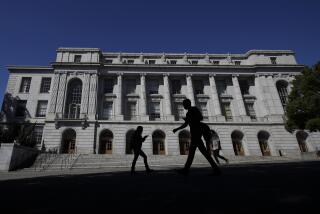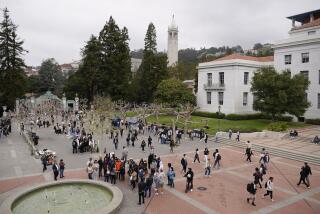UC pledges ‘transformational change’ to bring more equity, transparency to campus policing

Responding to prolonged national protests against racist policing, the University of California is vowing to make “transformational change” in campus safety practices with new independent accountability boards, public disclosure of more law enforcement data and a larger role for mental health and social service professionals.
UC President Michael V. Drake has unveiled a plan to meet this “pivotal moment in history” by moving the public research university system toward more inclusive, transparent and equitable campus policing practices. Drake, who is Black, has made the issue a top priority since taking UC’s helm last year, saying he and his family have personally suffered racial profiling by law enforcement.
“Recent events in our streets and our courts have catalyzed a powerful examination of policing, race and systemic injustice in America,” Drake wrote to the campus community in issuing the plan this week. “This integrated, holistic approach to safety and security is a significant culture shift for UC, and one that will require all of us working together with open hearts and minds.”
The plan rejected calls to abolish UC campus police and redirect funding to alternative safety approaches. Those calls have grown at campuses nationwide after the killing of George Floyd and other Black people at the hands of law enforcement. Campus policing critics point to decades of documented harm to students, faculty, staff and neighbors — particularly Black and Latino males who are disproportionately stopped by police without evidence of wrongdoing.
USC, for instance, recently unveiled its own campus safety review, which found troubling instances of racial profiling and a pervasive sense of “two USCs” where not everyone was treated with equal fairness and respect.
Controversy over policing has long roiled UC campuses, where officers were highly criticized for pepper-spraying peaceful protesters at UC Davis in 2011, their behavior during student demonstrations against tuition increases over the years and their handling of wildcat strikes last year by UC Santa Cruz graduate students demanding higher pay.
UC defended a continued role for campus police, however. In a Q&A posted with the plan, UC said campus police are better positioned to respond to problems than city or county law enforcement because they are often UC alumni who know the community and understand its complexity and myriad safety needs. UC is also able to hold campus police more accountable than outside agencies, the document said.
Leading campus critics dismissed the plan, which was crafted after two symposiums this year that built on previous systemwide and campus reviews of policing practices. A chief criticism is that the UC campus safety task force and symposiums were stacked with advocates for incremental or ineffective changes over those who have pushed for more sweeping reforms.
Both the UC Academic Senate Council, composed of faculty leaders at all 10 campuses, and the UC Student Assn. have called for disarming and substantially defunding campus police, proposing instead that those resources be redirected to support marginalized students and to study and develop other methods of campus safety. Several coalitions promoting those views have formed, including Cops Off Campus and the DIVEST/INVEST UCLA Faculty Collective.
“The entire process of creating this report was a dog-and-pony show,” said Dylan Rodriguez, a UC Riverside professor who has long advocated abolition of police on campus. “It was administrative performance ... to try to create a vast public systemwide image that was responding to the massive global rebellion against police legitimacy and anti-Black police powers” last year.
The plan sets out four broad guidelines, instructing campuses to implement them by various deadlines through June 2023. They include:
- Accountability through independent police accountability boards at each campus to investigate complaints against police.
- Data-driven improvement through a systemwide public dashboard displaying data on campus crimes, use of force, police stops, police staffing and budgets, service calls and complaints against officers, including resolution. UC says the dashboard will “break new ground” as the most detailed collection of police and safety data among U.S. universities.
- A broader definition of campus safety to include mental health, hunger, homelessness and anti-bias protection. Social service professionals, mental health specialists and unarmed security staff will join law enforcement to determine who should respond, a process that could reallocate duties and funding from police.
- An overarching vision of campus safety as a service to the diverse community rather than a more narrow view as law enforcement.
UC Davis Police Chief Joe Farrow, who heads the UC Council of Police Chiefs, said the report was “carefully balanced” and “well thought out.”
The Davis campus began rethinking its policing practices after the furor over pepper-spraying — creating a police accountability board in 2014. Although the UC plan offers the Davis board as a model, Farrow acknowledged that not everyone supports it.
UC Davis professor Seeta Chaganti said the board serves to preserve police power rather than support safety for all.
Farrow said Davis has begun reorganizing its safety forces to add unarmed security guards, students, mental health professionals and others.
“I’m hoping that they realize that everything doesn’t happen overnight, but we are trying,” Farrow said.
Naomi Waters, a UC Riverside student who was a member of the UC campus safety task force, said she hopes for change but feels “deeply skeptical.” She said UC did nothing to acknowledge or repair the harm caused to generations of students who have suffered harsh policing. She also had myriad questions about the plan — the accuracy and span of data displayed on the dashboard, for instance.
Another student task force member, Naomi Riley, said the independent accountability boards have no authority to enforce their findings — firing police officers, for instance.
Rodriguez said the plan does not specify how board members will be selected; if top administrators do so, he said, progressive voices will probably be shut out.
The plan’s emphasis on deterrence and prevention of crime would only exacerbate racial and gender profiling because it leaves officers to decide who is in need of deterrence, he said. Would a white student headed to a frat party be stopped as often as a Black male student?
Drake, however, emphasized that the plan was a “living document” that would continually evolve.
“I know these are deeply personal issues for many of you — as they are for me — and we won’t always agree on the best way to proceed,” he wrote. “But I know we can make meaningful progress by continuing to listen, collaborate and refine our approach.... Creating a more just and equitable world will always be a work in progress.”
More to Read
Start your day right
Sign up for Essential California for news, features and recommendations from the L.A. Times and beyond in your inbox six days a week.
You may occasionally receive promotional content from the Los Angeles Times.







